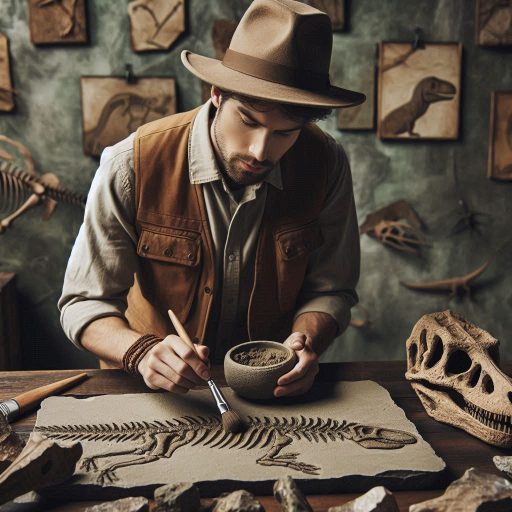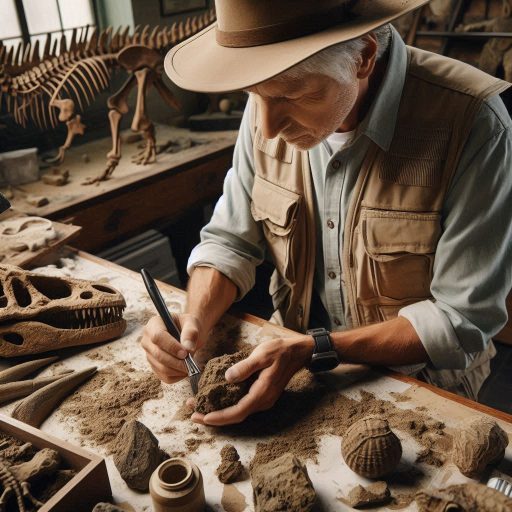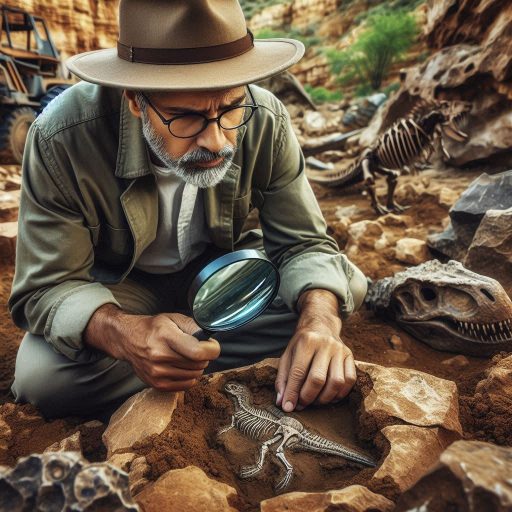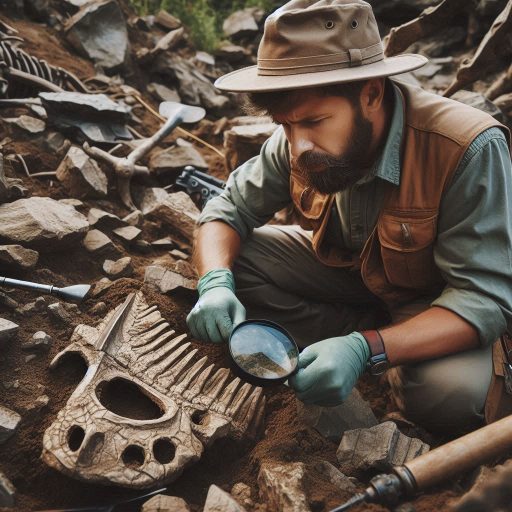Introduction
Internships and volunteer opportunities play a crucial role in paleontology, offering unique pathways for aspiring scientists.
These programs provide hands-on experience that enriches learning and skill development, helping students apply theoretical knowledge in real-world contexts.
Internships often involve working in laboratories, research facilities, and during field excavations, allowing participants to engage directly with fossil specimens.
Aspiring paleontologists gain invaluable insights into fieldwork, research methodologies, and specimen collection through these experiences.
By participating in internships, individuals learn essential techniques, tools, and methods used in paleontological research.
This practical exposure not only enhances their resumes but also builds professional networks, which can lead to future job opportunities and collaborations.
Networking is vital in this competitive field, as personal connections often pave the way for career advancements.
Moreover, hands-on experience fosters a deeper appreciation for the field of paleontology.
Interns and volunteers often find inspiration through direct engagement with fossils and ancient ecosystems.
They learn about the complexities of ancient life forms and their environments, reinforcing the significance of their studies.
Additionally, participating in internships or volunteer programs can ignite a passion for specific areas within paleontology.
Whether focused on fieldwork, curation, or research, these opportunities help individuals identify their interests and strengths.
Importance of Internships and Volunteer Opportunities in Paleontology
Internships and volunteer opportunities in paleontology play a crucial role in providing practical experience in the field.
These programs allow individuals to get hands-on experience with fossils, excavation techniques, and laboratory work.
By participating in these programs, aspiring paleontologists can apply skills learned in the classroom to real-world scenarios.
Practical Experience in the Field
One of the key benefits of internships and volunteer opportunities in paleontology is the opportunity to gain practical experience in the field.
Participants have the chance to work directly with fossils, fossils sites, and engage in fieldwork such as excavation, mapping, and collection techniques.
This hands-on experience is invaluable for developing skills and understanding the day-to-day work of a paleontologist.
Working Alongside Professional Paleontologists
Internships and volunteer opportunities also provide the valuable experience of working alongside professional paleontologists.
Participants have the chance to learn from experts in the field, gaining insights into research methods, interpretation of fossils, and scientific analysis.
This mentorship can help guide individuals in their career path and provide networking opportunities for future collaborations.
Enhancing Career Prospects in Paleontology
Participating in internships and volunteer opportunities can significantly enhance career prospects in paleontology.
The practical skills, knowledge, and networking opportunities gained through these experiences can make individuals more competitive in the job market.
Employers often value real-world experience, and internships and volunteer opportunities provide a tangible demonstration of a candidate’s dedication and passion for the field.
Basically, internships and volunteer opportunities in paleontology are invaluable for aspiring paleontologists.
These programs offer practical experience in the field, the chance to work alongside professionals, and opportunities to enhance career prospects.
By taking advantage of these opportunities, individuals can develop the skills and knowledge needed to succeed in the field of paleontology.
Types of internships and volunteer opportunities available in paleontology
There are several organizations, museums, and research institutions that offer internships and volunteer opportunities in paleontology.
These programs provide valuable hands-on experience for individuals interested in pursuing a career in this field.
Organizations, Museums, and Research Institutions
- Smithsonian Institution: Offers internships in various departments, including paleobiology, where participants assist with research projects and collections management.
- American Museum of Natural History: Provides volunteer opportunities to work alongside scientists in the paleontology lab and participate in field expeditions.
- Field Museum of Natural History: Offers internships in paleontology that involve cataloging fossils, conducting research, and assisting with educational programs.
- University of California Museum of Paleontology: Provides volunteer opportunities to help with fossil preparation, data analysis, and public outreach programs.
- Society of Vertebrate Paleontology: Offers internships and volunteer positions to help with conference planning, publications, and outreach initiatives.
Roles and Responsibilities of Participants
- Assisting with fossil excavation in the field under the guidance of experienced paleontologists.
- Preparing fossils for study by cleaning, labeling, and cataloging specimens in laboratory settings.
- Participating in research projects by collecting data, analyzing findings, and presenting results at conferences.
- Engaging in public outreach activities, such as giving tours, leading educational workshops, and writing articles for publications.
- Helping with museum exhibitions by setting up displays, organizing collections, and interacting with visitors.
Duration and Requirements for Participation
The duration of internships and volunteer opportunities in paleontology can vary depending on the organization and program.
Some programs may last a few weeks, while others could span several months to a year.
Participants are typically required to have a strong interest in paleontology and a background in earth sciences, biology, or related fields.
Additional requirements may include basic knowledge of scientific methods, good communication skills, and the ability to work well in a team.
Most programs are open to undergraduate and graduate students, as well as early-career professionals looking to gain hands-on experience in paleontology.
Some organizations may also offer opportunities for high school students or adults with a keen interest in fossils and ancient life.
Overall, internships and volunteer opportunities in paleontology provide a unique chance to explore the world of ancient life, contribute to scientific discoveries, and make valuable connections in the field.
Whether you’re excavating fossils in the field or working in a museum lab, these experiences can be incredibly rewarding and educational for aspiring paleontologists.
Read: The Impact of Technology on the Chemist Profession in the US
How to find internships and volunteer opportunities in paleontology
Tips for Researching and Identifying Opportunities
Finding internships and volunteer opportunities in paleontology requires thorough research.
Start by exploring various online platforms dedicated to paleontological work.
Websites like Paleontological Society and American Association of Stratigraphic Palynologists often post available opportunities.
Additionally, look for local universities with paleontology programs.
They frequently have information on internships and volunteer positions.
Social media can also be a valuable resource.
Follow paleontologists and institutions on platforms like Twitter and LinkedIn.
They often share announcements about opportunities.
Join groups and forums related to paleontology to connect with others in the field.
This engagement can lead to valuable insights and recommendations.
When researching, focus on organizations that align with your interests.
Determine if you prefer working in museums, research labs, or fieldwork.
Each setting offers unique experiences and learning opportunities.
Be clear about your goals, and tailor your search accordingly.
Identifying specific areas of interest will help narrow down options.
Suggest Reaching Out to Local Museums, Universities, and Organizations
Once you identify potential opportunities, take the initiative to reach out directly.
Local museums often seek volunteers to assist with exhibits and educational programs.
Contact their education or outreach departments to inquire about opportunities.
Many museums welcome enthusiastic individuals eager to contribute to their mission.
Universities also provide excellent resources.
Many academic institutions conduct ongoing research projects and look for interns.
Contact professors or researchers whose work aligns with your interests.
Express your enthusiasm and inquire about potential openings.
This proactive approach can yield valuable connections and experiences.
In addition, organizations such as the Society of Vertebrate Paleontology frequently offer internships.
Research their websites for information on application processes and deadlines.
Attend events hosted by these organizations to learn more about available opportunities.
Engaging with these groups can help you find internships that match your interests.
The Importance of Networking in the Field of Paleontology
Networking plays a crucial role in securing internships and volunteer positions in paleontology.
Building relationships with professionals can open doors to new opportunities.
Attend conferences, workshops, and seminars to meet others in the field.
These events provide platforms for sharing knowledge and experiences.
Networking can also lead to mentorship opportunities.
Establishing connections with experienced paleontologists can enhance your learning.
They can offer guidance, advice, and insights into the industry.
A mentor can help navigate your career path and introduce you to valuable contacts.
Furthermore, don‘t underestimate the power of informal networking.
Engaging with peers in your classes or online communities can lead to unexpected opportunities.
Share your interests and aspirations, and ask others about their experiences.
This exchange can provide insights into hidden opportunities and lesser-known organizations.
Therefore, securing internships and volunteer opportunities in paleontology involves research and networking.
Utilize online platforms and local resources to identify potential positions.
Reach out to museums and universities for direct opportunities.
Networking within the field is essential for building connections and gaining insights.
Engaging with professionals and peers fosters growth and opens doors for future endeavors in paleontology.
Read: Day in the Life: An Environmental Scientist‘s Typical Day
Benefits of participating in internships and volunteer opportunities in paleontology
How These Programs Can Help Build a Strong Resume
Internships and volunteer opportunities in paleontology significantly enhance your resume.
They provide practical experience that academic coursework cannot offer.
Many employers seek candidates with hands-on experience in their field.
Participating in these programs demonstrates your commitment and passion for paleontology.
These opportunities allow you to develop specific skills relevant to paleontology.
You can gain expertise in fossil excavation, identification, and analysis.
Such skills make you a more competitive candidate for future positions.
Additionally, internships often require the use of specialized tools and techniques.
Familiarity with these practices adds value to your resume and showcases your readiness for professional roles.
Moreover, internships and volunteer roles often involve diverse tasks.
You might assist in fieldwork, laboratory analysis, or data collection.
This variety not only enriches your experience but also illustrates your adaptability.
A well-rounded resume reflects your ability to take on various challenges in the workplace.
Transform Your Career Today
Unlock a personalized career strategy that drives real results. Get tailored advice and a roadmap designed just for you.
Start NowPotential for Making Valuable Connections in the Field
Internships and volunteer opportunities also offer excellent networking potential.
You will meet professionals already established in the paleontological community.
Building relationships with these individuals can lead to future job opportunities and collaborations.
Working alongside experienced paleontologists allows you to learn from their expertise.
They can provide insights into the field and guidance for your career.
Engaging in discussions about research and current trends enhances your understanding and opens doors for mentorship.
These connections can be invaluable as you navigate your professional journey.
Additionally, networking during internships can lead to job referrals.
Many employers prioritize hiring candidates recommended by trusted colleagues.
By making a positive impression during your internship, you can increase your chances of future employment.
These connections create a foundation for a successful career in paleontology.
Opportunity to Contribute to Important Research Projects
Participating in internships and volunteer opportunities allows you to contribute to important research projects.
Many paleontological research initiatives rely on the support of interns and volunteers.
By assisting in these projects, you actively participate in advancing scientific knowledge.
Contributing to research enhances your skills and deepens your understanding of paleontology.
You may have the chance to work on significant discoveries or studies.
This involvement can be incredibly rewarding and fulfilling.
Moreover, your contributions may lead to co-authorship on research papers, further boosting your professional credentials.
Working on meaningful research projects also allows you to see the impact of your efforts.
You can witness firsthand how paleontological findings contribute to broader scientific discussions.
This experience reinforces your commitment to the field and demonstrates your dedication to scientific inquiry.
Generally, internships and volunteer opportunities in paleontology provide numerous benefits.
They help build a strong resume, foster valuable connections, and allow you to contribute to important research projects.
These experiences not only enrich your professional journey but also strengthen the paleontological community as a whole.
Embrace these opportunities to kickstart your career in this exciting field.
Read: The Role of Chemists in US Environmental and Sustainability Efforts
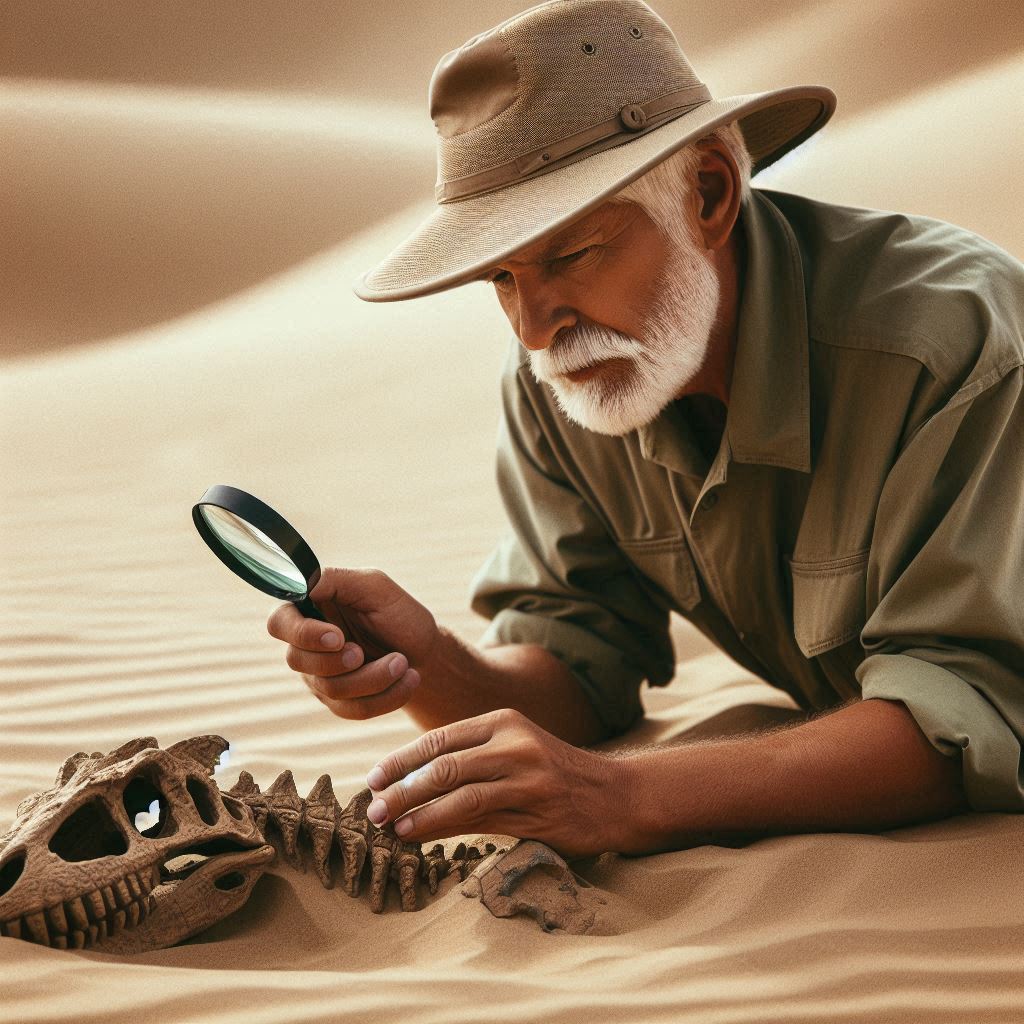
Challenges and Considerations for Participating in Internships and Volunteer Opportunities in Paleontology
Address Potential Obstacles Such as the Competitive Nature of These Programs
Internships and volunteer opportunities in paleontology are highly sought after.
Many students compete for limited positions in research institutions, museums, and field projects.
This competitiveness can discourage aspiring paleontologists, but it is essential to stay motivated.
A strong application showcasing relevant skills and passion increases your chances of selection.
Networking plays a crucial role in overcoming these obstacles.
Engaging with professionals at conferences or seminars can open doors to opportunities.
Consider reaching out to professors or professionals in the field for advice.
They may provide insights or recommend openings that are not widely advertised.
Building relationships in the field can lead to valuable recommendations.
Financial Implications of Participating in Unpaid Opportunities
Many internships and volunteer opportunities in paleontology are unpaid.
This financial reality can be challenging for students and early-career professionals.
They may struggle to cover living expenses while committing to these roles.
Some may consider seeking part-time jobs to support themselves during unpaid positions.
However, the experience gained from these opportunities can be invaluable.
Hands-on experience in fieldwork or laboratory settings enhances your resume.
Many employers value practical experience over monetary compensation.
Consider applying for grants or scholarships that support internships in the sciences.
Some organizations offer funding specifically for students pursuing unpaid opportunities.
Additionally, remote internships are increasingly available.
These opportunities allow you to gain experience without the need for relocation.
They often offer flexible schedules, making it easier to balance work with other commitments.
Pursuing online courses related to paleontology can further enhance your skill set while working remotely.
Offer Advice for Balancing Academic Commitments with Hands-On Experience
Balancing academic commitments with internships can be challenging.
Time management is crucial for success in both areas.
Create a schedule that prioritizes classes, study time, and fieldwork or volunteering.
Setting clear goals for your academic and professional development will help you stay focused.
Communication with academic advisors is also important.
Discuss your internship plans with them to ensure they align with your academic requirements.
Some programs offer academic credit for internships, allowing you to gain practical experience while fulfilling your degree requirements.
Be proactive in seeking such options.
Finally, consider starting with shorter commitments.
Look for opportunities that allow you to gain experience without overwhelming your schedule.
Short-term projects can provide valuable insights into the field without requiring a long-term commitment.
This strategy can help you assess your interest and availability before taking on larger roles.
In general, pursuing internships and volunteer opportunities in paleontology can be competitive.
Financial implications may arise from unpaid roles, but the experience gained is invaluable.
By managing your time effectively and seeking guidance, you can balance your academic commitments with hands-on experience.
Embrace these challenges as steps toward building a rewarding career in paleontology.
Read: Essential Skills and Tools for Modern Chemists in America
See Related Content: Educational Path to Becoming a Paleontologist
Discover More: Important Tools and Technologies in Virology
Personal Experiences and Testimonials from Past Participants
Share Anecdotes from Individuals Who Have Participated in Internships or Volunteer Programs
Internships and volunteer opportunities in paleontology offer invaluable experiences.
Many individuals share transformative stories about their time in the field.
For instance, Jane, a recent graduate, volunteered at a local museum.
She assisted in curating a dinosaur exhibit, which sparked her passion for public education.
Her experience allowed her to engage with visitors and explain complex concepts in accessible terms.
Similarly, Mark interned at a renowned fossil excavation site.
He recounted the thrill of unearthing a complete skeleton for the first time.
The adrenaline rush during that moment solidified his decision to pursue paleontology as a career.
Both Jane and Mark learned essential skills during their experiences, which became foundational for their professional journeys.
Insights into the Impact of These Experiences on Their Career Paths
Internships and volunteer positions significantly impact career paths in paleontology.
Many participants gain practical skills that enhance their resumes.
For instance, Jane developed strong communication and organizational skills while working at the museum.
These skills helped her secure a job as a science communicator after graduation.
Her experience in public outreach gave her the confidence to engage diverse audiences.
Mark’s internship provided hands-on fieldwork experience, a critical aspect of paleontology.
His direct involvement in excavations improved his technical skills, making him a competitive candidate for graduate programs.
He later secured a research assistant position at a major university, where he continues to develop his expertise.
Other participants also echo these sentiments.
Maria, who volunteered for a conservation project, learned about fossil preservation techniques.
This knowledge led her to a career in conservation biology, demonstrating how diverse pathways can emerge from similar experiences.
Success Stories and Lessons Learned from Their Time in the Field
Success stories from internships and volunteer opportunities illustrate the benefits of these experiences.
Many participants report increased confidence and a clearer understanding of their career goals.
They emphasize the importance of networking during their time in the field.
Connections made during internships can lead to job opportunities and collaborations in the future.
Participants also highlight the value of adaptability.
For instance, while volunteering, many encountered unexpected challenges.
Whether it was adverse weather conditions or difficult terrain, each situation taught them resilience.
Learning to adapt to changing circumstances became a valuable lesson for all.
In essence, internships and volunteer opportunities in paleontology shape individuals‘ career paths in profound ways.
Anecdotes from those who have participated highlight the significance of these experiences.
They gain essential skills, build professional networks, and clarify their career goals.
Success stories showcase how these positions lead to fulfilling careers, while lessons learned emphasize adaptability and resilience.
For anyone considering a career in paleontology, pursuing internships or volunteer work is a critical step toward success.
Delve into the Subject: Archaeology Internships: Finding the Right Fit
Explore Further: Nuclear Science: Industry vs. Academia
Conclusion
In this blog, we discussed the immense value of internships and volunteer opportunities in paleontology.
These experiences are crucial for anyone aspiring to make a mark in this fascinating field.
Internships provide hands-on training and practical skills that are essential for developing expertise in paleontological research and fieldwork.
By immersing yourself in real-world projects, you gain a deeper understanding of scientific methodologies and the intricacies involved in fossil excavation and analysis.
We highlighted various organizations and institutions that offer valuable programs, including museums, research institutions, and conservation groups.
These opportunities not only allow you to apply theoretical knowledge but also enable you to collaborate with experienced professionals in the field.
Engaging in internships often leads to networking connections, which can significantly benefit your future career prospects.
Additionally, volunteering can enhance your understanding of paleontology and strengthen your resume, making you a more competitive candidate in the job market.
I urge aspiring paleontologists to actively seek out these opportunities for hands-on experience in the field.
The knowledge and skills gained from internships and volunteer positions are invaluable for your professional growth.
They allow you to develop a strong foundation in paleontology while fostering your passion for the discipline.
[E-Books for Sale]
The Big Book of 500 High-Paying Jobs in America: Unlock Your Earning Potential
$19.99 • 500 High-Paying Jobs • 330 pages
Explore 500 high-paying jobs in America and learn how to boost your career, earn more, and achieve success!
See All 500 High-Paying Jobs of this E-Book
1001 Professions Without a Degree: High-Paying American Jobs You Can Start Now
$19.99 • 1001 Professions Without a Degree • 174 pages
Discover 1001 high-paying jobs without a degree! Unlock career tips, skills, and success strategies for just $19.99!

